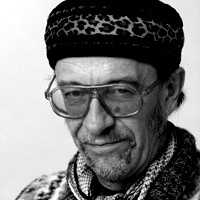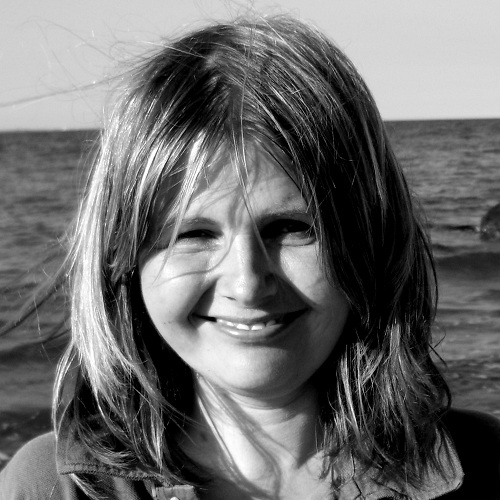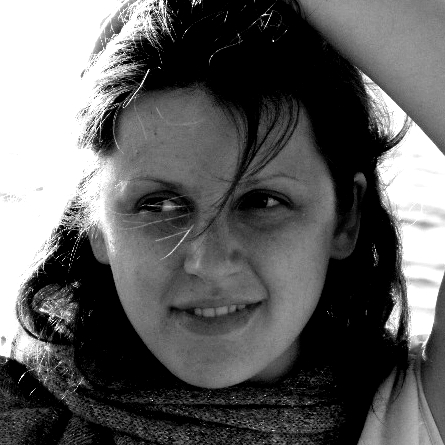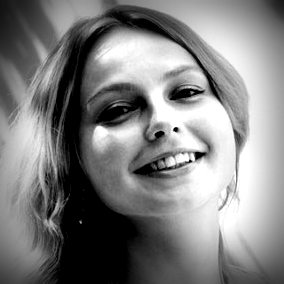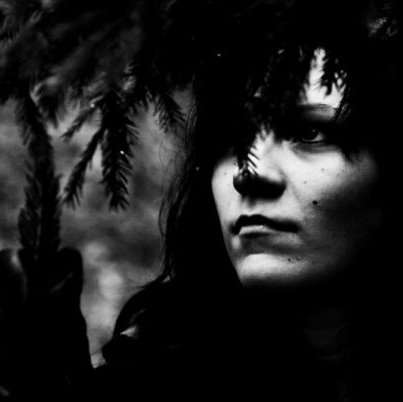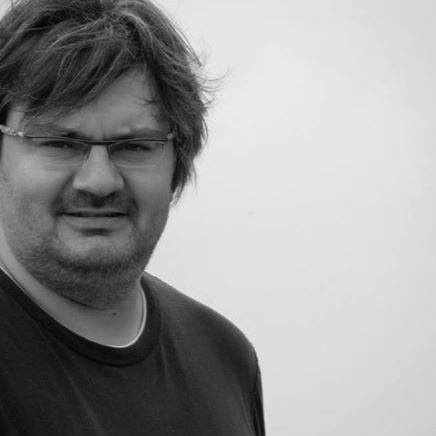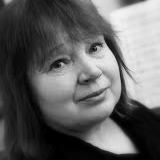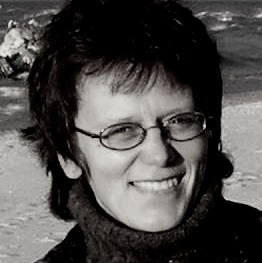|
JURIS ABOLS
|
"The life of a person is
involved with perpetual cognition. That
materialisation does not allow me to repeat
myself in my music. Onward! Our era’s realities
are quixotic, if I desire, I can join a large
mob carrying weapons; there is not much
difference between a Dadaist and a journalist –
or, how many of the greats thought – Dada is
all. All is dada. Still, only faith can separate
the adequateness of the reflection of reality.
It is good, if it is larger than a mustard seed,
since today any text does not make much sense –
mankind, which, from its own experience, has not
learned anything in ten thousand years – in
reality, is tormented by the same two questions,
as in the Palaeolithic Era: What to do? And: Who
is at fault?... That is why I do not try to
complicate or beautify my aesthetic problems –
if only for necessity’s sake – but I still do
place a great awareness on the quality of
information. My consciousness tells me
everything that I need to know directly and –
aesthetic daring – getting to know those actual
facts, which are ridiculed by people... To
review a person’s cultural-historical experience
is difficult. But it is beautiful... I do not
crave beauty – that is why I do not compose very
much." Juris Abols
The composer Juris Abols was born on April 16th, 1950, in Riga, to the family of painter Ojars Abols and linguist Mirdza Abola. He completed the Latvian State Conservatory (now the Academy of Music) in the flute class of Janis Morics, receiving his diploma in teaching and concert performance (1972) and the composition class of Adolfs Skulte (1982); after that he worked as a free-lance artist. He performed in the Latvian National Opera Orchestra (1976–1978). In the period of independence renewal, he worked in the field of journalism, and he performed in a piano trio together with composer Edmunds Goldšteins and violinist Janis Bulavs, performing classical, the music of Latvian composers, as well as his own music. In 1988/1989, he recorded and produced the record Smilšu laiks (Time of Sand) as a testament to this collaboration. From 1998 until 2005, he worked as an organist in Strasbourg, France, involving himself in the sphere of Catholic Church music. As of 1987, he is a member of the Latvian Composers’ Union. From his father he inherited a philosophical world view, which is centred in humanism and the observation of the world’s social process - the complicated interconnections, contexts and cross-cuts. Beginning already with his first approbated works (Piecas latviešu dejas [Five Latvian Dances], Prelude and Toccata) the thematic centre is – thoughts of people, their inner world, reaching into the deepest depths of consciousness, to which are dedicated a considerable, psychedelically centred plethora of compositions since the beginning of the 80s. Here he has learned from Luciano Berio and Mauricio Kagel, but still holding on to his own individual style – experimenting with the human voice in many difference emotional situations, using ancient deceased languages (Carmina byzantica, Normala fiziologija [Normal Physiology] and others), exploiting a whole five languages in one opus (Musu cilveks Beiczina (L’amiral cherche une maison a louer) [Our Man in Beijing]. Altogether, language is used on all levels – beginning with intonemes materializing in the consciousness until their electronic transformation, from the ancient Greek, Thracian, Assyrian language, to the so-called imaginary languages, in the Dadaist lexicon, and finally – his birth language with its dialects. Cultural history, ancient culture and civilization expert: occasionally in his works we see some cultural reference. He does not flee from the most traditional means of music expression, for example, the classical harmony school. He is interested in national cultures, the historical and geographical parallels. In his free time – ethnic genesis and ancient cultures, which research resulted in the assembling of the Baltobalkanistikas Enciklopedijas [Balto-Balkan Encyclopedia] (2002) and separate research manuscripts. He researches regularly. Overall, he is a bitonalist and polytonalist. Polystylist. At the end of the 90s, Dadaist opuses competed with works composed in a traditional style; in 2004, to this symbiosis electronica and folk-rock was added (Jautra sabiedriba [Joyous Society]). The motifs are not particularly ironic; jeering, sarcasm, absurd humour, especially at the time of the turn of the century. Still, in this irony there is no evil; if ethics prevails over aesthetics – then that is a cultural-history experience of humanity or cultural process reward. The sounds of his opuses can be tinted with a resigned, sad smile, along with that, those enjoying his musical process are given the question: But why?... J. Abols’ publications on cultural problems are also found in the Latvian press and concert reviews. His recordings – in the Latvian Radio sound recording library, the Latvian National Library Music Division; manuscripts – the Latvian National Library Music Division, the Latvian Academy of Music sheet music library. Photo materials – in the personal archives of composer Edmunds Goldšteins. (Juris Abols, Marite Dombrovska) http://www.musicabaltica.lv/en/autori/303, Photo: Edmunds Mickus |
|
MARINA GRIBINCHIKA
|
"I do not think that my music
means anything to anyone else – I simply enjoy
the process of composition."
Marina Gribincika was born August 9th, 1966, in a village in the Volinia region in the Ukraine. She completed the Jazeps Medinš College of Music in the composition department (1986) and the Latvian Academy of Music, gaining her bachelor’s degree (1992) and master’s degree (2004) in composition. From 1990 to 1998, she participated in young composers’ seminars in the Art House in Ivanov, Russia. From 1995 to 1997, she trained in composition with Sergei Berinski in Moscow. She was a teacher of composition and theory at the Pavuls Jurjans Children’s Music School in Riga (1989–1992), solfeggio and piano teacher in the creative organisation VAKS, the Riga Musical Theatre Actors’ School (1993–1995), a composer at the Riga Musical Theatre (1995–1998), teacher of solfeggio at the Riga 4th Music School (1999–2000). As of 2000, she works as a solfeggio and composition teacher at the Emils Darzinš College of Music. The composer was awarded the Russian (1995–1996) and Moscow Composers’ Union scholarship (1996–1997). As of 1994, M. Gribincika is a member of the Russian Composers’ Union, as of 1996, a member of the Latvian Composers’ Union. The composer’s music frequently is performed at concerts and festivals. http://www.makslinieki.lv/profile/592/ |
|
LAURA GUSTOVSKA
|
Laura Gustovska
is a Latvian composer of the newest age, born on
1986. She started her musical studies as a
tradicional latvian music instrument – kokle –
player. Later on she finished studies in music
theory and composition both at highschool and
music academy (studied at Romualds Kalsons and
Selga Mence). Gustovska is now studying for a
master’s degree in composition in Jazeps Vitols
Latvian music academy. Currently she is also a
pedagogue in Liepaja music highschool.
Gustovska has written music for orchestra, choir, chamber ensembles and electronics. Her music has been performed in several festivals (Latvian new music days, electronic music festival Sound Forest) and also has been in a laureate list of composition competitions as creative work competition of children choral songs Who we are, were and will be, new music festival Arena. Gustovska’s music is like a fine fabric with a nuanced texture. The ritmical intensity is natural and steady as a breath or heartbeat, it familiary lays into the whole texture. With a careful and tolerant attitude towards both musician and instrument, she fortunes to create significant and unique musical ideas. Being interested in electroacoustic world, she still respects all that is natural, acoustic and alive. http://youtu.be/LEMVg7uDClo |
|
OSKARS HERLINS
|
Oskars Herlins
created his first compositions using a PC
ZX-Spectrum 128 which has 3 audio channels and
8-bit sound. Few years later he started to play
the electric guitar, formed several rock bands,
and wrote music for them. During this time
Herlins took private trumpet lessons under the
guidance of a trombonist and wind band conductor
Dimitrijs Grozovs. In 2001 Herlins started to
study the philosophy at the University of Latvia
and graduated in 2007 gaining master’s degree.
From 2004 to 2008 Herlins studied composition
under the supervision of a composer Maija
Einfelde at the night music school ‘Ridze’.
After the graduation he participated in master
classes for young musicians held in Ogre,
Latvia, where a composition contest was
organized and Musica Baltica publishing house
awarded a prize for his piece ‘Etide diviem’
(‘Etude for Two’) – publication of the piece. In
2008 Herlins took private lessons in composition
under the supervision of composer Imants
Mežaraups. Oskars Herlins studied electronic
music under David Mondrup’s supervision at the
Engelsholm Folk High School in Denmark for two
semesters in 2009 and 2010. A piece ‘Through
Imaginary Worlds’ composed by Herlins was among
the five winners of the electronic music
composition contest Elektrochok 2009 held by the
Academy of Music and Music Communication in
Esbjerg, Denmark. His vocal chamber piece
‘Tunsa, ka-'annaka lam takun’ (‘You Will be
Forgotten as if You Never Existed’) won the 3rd
place in a competition called Valodas skana Tuvo
Austrumu dzeja (‘Sound of Language in Poetry of
Middle East’), held within the framework of
Arena 2009 – festival of new music in Riga,
Latvia. He used poetry written by Mahmoud
Darwish in this piece. In 2010 Oskars Herlins
was enrolled at Jazeps Vitols Latvian Academy of
Music and started bachelor studies in
composition under the guidance of composer
Rolands Kronlaks. In 2011 his vocal chamber
piece ‘Variations’ won the 2nd place in the
competition named Balss teatris (‘Voice
Theatre’), held within the framework of Arena
2011 festival of new music. In November 2011
Oskars Herlins participated in a master class in
composition (which is a part of Brücken
(‘Bridges’) festival held in Rostock, Germany)
with Wolfgang Rihm as the residing composer.
http://www.myspace.com/oskarsherlins |
|
ANASTASIJA KADISA
|
Anastasija Kadiša
was born in Jurmala (Latvia) in 1985. Since the
age of eight she began to study music
professionally by starting to play piano at the
Music School of Jurmala with Maija Berzina and
after with Irene Štrause later getting a diploma
as pianist. Meanwhile she gradually got
interested in musical composition writing her
first pieces under the supervision of the
composer Rihards Dubra. In 2005 she continues
her studies in composition at Jazeps Vitols
Latvian Music Academy by the composer Juris
Karlsons obtaining a 4-year bachelor degree in
music composition in 2009. Still in her bachelor
she received the Olgerts Ziverss Prize in piano,
while, in 2007, she also took part in the
International Piano festival in Vilnius,
Lithuania. In 2008/2009 within the framework of
the Socrates Erasmus Program she studied
composition at the Music high school in Cologne
with the composer Krzysztof Meyer. In 2009 she
attended the Music Visualization Laboratory in
Vilnius which is part of the music laboratory
network THE PROCESS. Since 2007, she
participated in the Next Generation master
classes organized within the Donaueschinger
Musiktage in Donaueschingen, Germany as well as
in the contemporary music festival Brücken in
Rostock, Germany. Since 2011 she is member of
the Latvian Composer Union. Compositions of
Anastasija Kadiša were performed in several
contemporary music festivals in Latvia (New
Latvian Music Days), Lithuania (Vilniaus
Veidai), Germany (Brücken and The Next
Generation) and Switzerland. At the moment she
is working towards her master degree in
composition and music theory at the Music
Academy of Basel, Switzerland by Prof. Georg
Friedrich Haas.
|
|
IEVA KLINGENBERGA
|
Ieva Klingenberga
was born on September 17, 1986 in Riga, Latvia.
She studied Music theory and Composition at the
Emils Darzinš College of Music (2002-2006). In
2006 she started her studies of Composition at
the Jazeps Vitols Latvian Academy of Music with
assoc. professor Andris Vecumnieks, accomplished
her Bachelor’s degree in 2010. Ieva Klingenberga
improved her knowledge of Composition at the
Sibelius Academy, Helsinki in 2008. She studied
there as a part of the Socrates/Erasmus student
exchange programme with Lauri Kilpiö. Currently
she studies for the Master’s degree in
Composition at the Jazeps Vitols Latvian Academy
of Music with university lecturer Rolands
Kronlaks. Ieva Klingenberga has participated at
the International Latvian Young Musicians’ Camp
in Ogre (2004), the Donaueschinger Musiktage
Workshops for students The Next Generation
(2009, 2010, 2011) and the Workshop for students
as a part of the Schwetzinger Festspiele (2010)
in Germany. Her music has been performed at the
music festival Latvian New Music Days in Riga
(2011) and in other concerts. Videosample:
"Tänzerin" for voice, flute, percussions,
electronics and video projections: http://www.youtube.com/watch?v=gkBvjJhhBvQ,
http://www.myspace.com/ievaklingenberga/ |
|
ROLANDS KRONLAKS |
Rolands Kronlaks was born in Liepaja on March 20, 1973. He studied composition with Tamara Kalna at Jazeps Medinš Secondary Music School and with Gederts Ramans at Jazeps Vitols Latvian Academy of Music (JVLMA), graduating the Academy in 1996. After postgraduate studies at JVLMA with professor Juris Karlsons he obtained his Master’s diploma in 2002. Rolands Kronlaks completed IRCAM composition and electronic music courses in Paris, where he studied with Phillipe Hurel, Marco Stroppa, Brian Ferneyhough and others (1998–1999). He took part in young composers’ seminars at Ivanov (Russia, 1996–1997) and studied with David Rowland at Enschede Conservatory in the Netherlands in frames of the TEMPUS program (1997). Rolands Kronlaks participated in Franco Donatoni’s masterclass in Mexico (1998) and, under the Royaumont Foundation Program Voix nouvelles studied at the Abbey of Royaumont (France) with Brian Ferneyhough, José Evangelista, and Jean-Luc Hervé (2000). From 2004 to 2006 he studied composition with Hanspeter Kyburz and electroacoustic music with Wolfgang Heiniger at Hanns Eisler Academy of Music in Berlin. Compositions of Rolands Kronlaks have been performed in concerts and festivals in Latvia, Lithuania, Russia, The Netherlands, Germany and France by such musical units as Nouvel Ensemble Moderne, Nieuw Ensemble, Court-Circuit Ensemble, The Latvian Radio Choir, Sinfonieta Riga and others. Rolands is a member of JVLMA Composition Department and teaches composition, contemporary composition techniques, electroacoustic music and contemporary music notation. Since 2007 Rolands Kronlaks pursues doctoral studies at Jazeps Vitols Latvian Academy of Music under the supervision of professor Jelena Lebedeva. His research topic is related to the manifestations of self-similarity and biological growth phenomena in the contemporary composition techniques. |
|
SELGA MENCE |
"I am proud that I am a Latvian composer, since we have an incalculable wealth – Latvian folk songs, whose melodic intonations and substantive imagery is an inexhaustible fountain for works in many different compositional techniques." Selga Mence Selga Mence was born on January 12th, 1953 in Liepaja. Her father – math teacher Janis Mencis. In his youth, he studied choir conducting at the Jekabs Vitolinš Education Institute of Riga. Her brother Janis Mencis Jr. is also a mathematician. Selga Mence graduated the 5th High School of Liepaja, with a focus on German (gold medal, 1971), after two years she was at the Emils Melngailis Music College of Liepaja, then the composition class at the Latvian State Conservatory and studies with Pauls Dambis (1978, 1988). She has studied musicology. She worked for many years at the Latvian Culture Ministry Repertoire Editorial Council (1980–1987). In the 80s, she managed the children’s music sphere in the Composers’ Union. As of 1985, she is a lecturer and is currently an associate professor in the Latvian Academy of Music composition department. As of 2004, Selga Mence has been the head of the composition department at the Latvian Academy of Music. Selga Mence’s name was first highlighted in association with choir music. Her works were performed at the Scandinavian Song Festival in Norway in 2000 and at many Song Festivals in Latvia, the United States, and Canada. Many Latvian choirs have achieved victory at international competitions with her works. Selga Mence has participated in such projects as the Songbridge 2000 festival Europa Cantat XIV in Nevers, France, and at the Month of European Music in 2001, Basel. Her cycle Dziesmas (Songs) for two pianos was included in the top ten recommended works at the 1999 International Rostrum of Composers in Paris. Choir songs, children’s music – in these genres of creative work Selga Mence’s bright emotionality has been especially expressed, as well as the liveliness of musical images, love of Latvian folk verses with the traditional, stable world of value. Often using Latvian (and Liv) folk melodies and texts (often blurring the boundary between folksong arrangement and original music) altogether included in the national romantic tradition that still is developed with contemporary compositional materials. The works display sonoric colouristic possibilities and aleatoric characteristically improvisational games. Of highest importance is the intonative material that, determinedly and logically – Selga Mence’s characteristic qualities – directs, sets alight the work’s overall perception. Guntars Pupa correctly wrote, that she, as one of the first of the new composers, actualised melody in Latvian music in the 80s. (Literatura un Maksla, 1986). It is possible that, due to this creative influence, the song genre has become significant in her newest instrumental writings, in a symbolic way concentrating within herself a very nuanced poetic character. © LMIC |
|
JACHIN POUSSON |
Jachin Pousson is an American musician, composer and sound designer currently living in Riga, Latvia. Before pursuing musical endeavors he was a commercial graphic designer and film-maker. He began performing music professionally in Singapore as a drummer and lyricist, leading to several international festival appearances and showcases. Following that he became a humanitarian worker in Asia, Africa and Eastern Europe where he often took on an additional role to document the work in writing, film, photography or sound recording, making many personal recordings of his own. Subsequently he moved to Copenhagen for a formal music education in composition. Drawn to the musical aesthetic of the Baltics, he is at present pursuing further music education in Latvia. http://rainworld.wix.com/music |
|
INDRA RISE
|
Indra Riše was
born on June 11th, 1961 in Ogre, Latvia.
Having graduated from the Jazeps Vitols
Latvian State Conservatory as a pianist in
1985, Indra Riše turned her attention to
composing music and completed her second round
of education, graduating from professor
Peteris Plakidis’ composition class in 1990.
In 1993, Indra Riše won the scholarship of the
Danish Ministry of Culture and went to
Copenhagen, where she continued her
advancement in composition with Niels
Rosing-Schow and electro-acoustic composition
with Ivar Frounberg. Thus she was the first
woman in Denmark who mastered a full course in
composition. An essential role in her
education was played also by: •
the Summer Workshop in New Technologies for
Music Performance and Composition, University
of California, Berkeley (1995); •
IRCAM Summer Academy in Paris (1999); •
Opera Academy, Oslo (2001); •
International Composer’s Center, Visby,
Gotland (2004). Indra Riše
stayed in Denmark until 2002, composing
commissioned works and periodically working as
a music copyist and arranger for various
orchestras for the Copenhagen Royal Opera, the
Samfundet sheet music publisher, and Danish
Radio. Indra Riše has written also piano
scores from dramatic-musical works by Danish
composers (Ib Nřrholm, Erik Norby). Since
2002, Indra Riše has been living in Latvia and
is active as a composer, revealing her locally
and internationally polished talent in a
comprehensive variety of genres, from songs
for choirs, chamber music and electronic works
to symphonic and vocal-symphonic scores. Indra
Riše has two dedicated CDs (released in1998
and 2000). The
compositions by Indra Riše have been played at
festivals and concerts in Baltic States,
Scandinavian countries, Germany, United
Kingdom, Russia and elsewhere. |
|
GUNDEGA SMITE |
"The search for my inner world of sound seems an eternal one and it is difficult to explain the process… like a slow deep dive… Deeper even into the unknown, not yet felt... Sound, words, silence – all of it truly phenomenal – open to unending possibilities…" Gundega Šmite Gundega Šmite was born on June 5th, 1977, in Riga. She studied at the Jazeps Medinš College of Music (1992–1998), and also at the Latvian Academy of Culture in the screen and stage theatre art department (1996–1997). In 1998, she began studies at the Vitols Latvian Academy of Music in the composition department with Peteris Plakidis, under whose direction she received her Bachelor’s degree in 2005 and Master’s degree in 2007. She worked as a music theory and piano teacher at the Kekavas Music School (1999–2000), and as organist at the St. John’s Congregation in Philadelphia, USA (2001–02). She was also a teacher at the St. John’s Congregation Latvian School in Philadelphia and later was teacher of music literature at the Riga Music School No. 3 (2002), and as of 2005, she works as a teacher of composition at the Daugavpils College of Music. For her work Parvertibas (Transformations) she won first prize at the Latvian Academy of Music competition (1999) and gained a World Federation of Free Latvians Cultural Foundation recognition certificate for her works Atgriešanas (Homecoming) and Atnakot (Arriving, 2001). She gained 6th place at the 2005 International Rostrum for Composers competition for composers younger than 30, 2nd place (no first place was awarded) at the festival Culturescapes international young composers’ competition (for the work Isochasma, 2006), and received the Talivaldis Keninš Award (2006). She took part in the 5th International Latvian Music Camp at Ogre and also at the Baltic Young Composers’ Mastercourses at Dundaga, and the Academic d’Villecroze in France. In the 2005/2006 academic year, as part of the Socratus Erasmus exchange program, she supplemented her education with studies at the J. Sibelius Academy of Music with Veli-Matti Puumala. Her works have been performed in Latvia, Lithuania, Switzerland, Austria, France, Germany, Japan, the U.S.A. and New Zealand. She is a member of the Latvian Composers’ Union (as of 2006), chairman of the board (as of 2009). © LMIC, http://www.musicabaltica.com/
|
